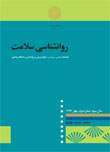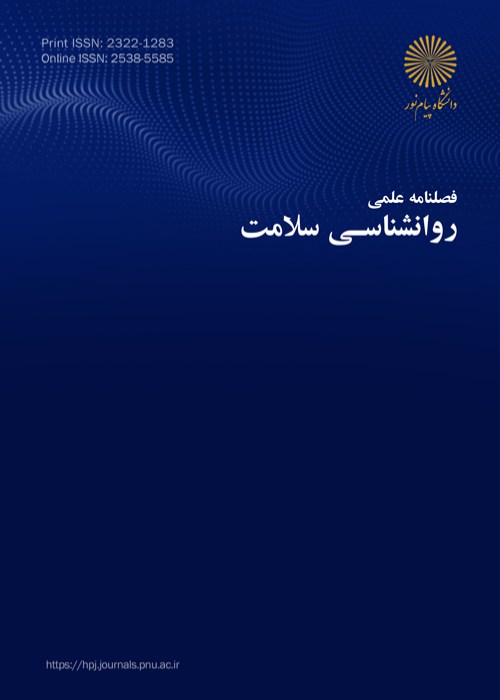فهرست مطالب

فصلنامه روانشناسی سلامت
پیاپی 18 (تابستان 1395)
- تاریخ انتشار: 1395/06/20
- تعداد عناوین: 5
-
-
صفحه 5زمینهمطالعه عزت نفس یکی از فراوان ترین روش های مطالعه تفاوت های فردی در روانشناسی است. نظریه ارتباط میان عزت نفس و عملکرد قلبی عروقی متکی بر این موضوع است که عزت نفس می تواند برای افراد، احساسات توام با ایمنی در مواجهه با تهدید و استرس فراهم آورد.هدفهدف از اجرای تحقیق حاضر بررسی ارتباط میان سطوح عزت نفس آشکار و ناآشکار با ضربان قلب، فشار خون سیستولیک و فشارخون دیاستولیک به عنوان شاخص های قلبی عروقی بود.روشتحقیق حاضر یک مطالعه توصیفی از نوع همبستگی بود که بر روی 320 نفر با استفاده از نمونه گیری تصادفی انجام شد. عزت نفس آشکار و ناآشکار آزمودنی ها به هنگام ورود به آزمایشگاه اندازه گیری و سپس فشار خون و ضربان قلب آن ها اندازه گیری و ثبت شد.یافته هانتایج حاصل از ضریب همبستگی اسپیرمن و تحلیل رگرسیون نشان داد میان عزت نفس آشکار و شاخص های عملکرد قلبی عروقی در هر سه مورد همبستگی منفی معنی دار (01/0> P) وجود دارد. تحلیل رگرسیون دادها نشان داد عزت نفس آشکار و ناآشکار توانستند فشار خون سیستولیک و ضربان قلب را در سطح معنی داری پیش بینی کنند. در هر دو زمینه، عزت نفس ناآشکار توان پیش بینی کنندگی بیشتری نسبت به عزت نفس آشکار داشت.نتیجه گیریبه طور کلی نتایج نشان داد عزت نفس پایین در سطح معنی داری می تواند پیش بینی کننده ضربان قلب و فشارخون بالا و برعکس، عزت نفس بالا می تواند پیش بینی کننده ضربان قلب و فشارخون پایین باشد.کلیدواژگان: عزت نفس آشکار، عزت نفس ناآشکار، فشارخون، ضربان قلب
-
صفحه 21هدفتوجه به علائم روانشناختی بیماران سرطان پستان به دلیل تاثیر نیرومند بر ابتلا، سیر و پیش آگهی این بیماری، بسیار مهم است. پژوهش حاضر با هدف بررسی اثر بخشی درمان فراشناختی به شیوه گروهی بر افسردگی و نشخوار فکری زنان مبتلا به سرطان پستان انجام شد.روشپژوهش حاضر، نیمه آزمایشی با پیش آزمون-پس آزمون و دوره پیگیری (2 ماه و 4 ماه) بود که در اسفند 1391 تا اردیبهشت 1392 انجام شد. در این پژوهش 24 نفر از بیماران مبتلا به سرطان پستان مراجعه کننده به بیمارستان امام حسین شهر تهران به شیوه نمونه گیری دردسترس انتخاب شدند و به صورت تصادفی در دو گروه درمان فراشناختی (n=12) و گروه گواه (n=12) قرار گرفتند و با استفاده از مصاحبه ساختار یافته بالینی (SCID)، پرسشنامه اضطراب، افسردگی و استرس (DASS-21) و پرسشنامه نشخوار فکری (RRS) مورد پیش آزمون قرار گرفتند. سپس گروه آزمایش به مدت 8 جلسه تحت آموزش درمان فراشناختی قرار گرفت و گروه گواه هیچ مداخله ایی دریافت نکرد. در پایان هر دو گروه مورد پس آزمون و 2 مرحله پیگیری (2 ماه و 4 ماه) قرار گرفتند و داده ها با استفاده از نرم افزار 20-SPSS و روش تحلیل کوواریانس چند متغیره مورد تجزیه و تحلیل قرار گرفتند.یافته هاپژوهش حاضر نشان داد که بین دو گروه آزمایش و گواه پس از اجرای درمان فراشناختی تفاوت معناداری وجود دارد) 005/0> .(P به طوری که، میانگین نمره افسردگی و نشخوار فکری گروه آزمایش نسبت به گروه کنترل کاهش یافت.نتیجه گیریبا توجه به نتایج پژوهش که نشان داد درمان فراشناختی در کاهش علائم افسردگی و نشخوار فکری زنان مبتلا به سرطان پستان موثر می باشد، می توان پیشنهاد داد که به غربالگری روانشناختی بیماران مبتلا به سرطان پرداخته و بیماران نیازمند مداخله طی کارآزمایی های بالینی مناسب مورد توجه قرار بگیرند.کلیدواژگان: درمان فراشناختی، افسردگی، نشخوار فکری، سرطان پستان
-
Page 5Backgroundthe study of self esteem is one of the most common methods for studying individual differences in psychology.Acording the theory of the relationship between self-esteem and cardiovascular function ( Martinz , Greenberg, and Alan, 2008 ) self-esteem it can be related with feelings of safety in the encounter with threat and stressObjectivesThe aim of the present study was to investigate the relationship between explicit and implicit self-esteem levels, with heart rate, systolic and diastolic blood pressure as index of cardiovascular.MethodsThis study was a correlative study on a sample of 320 subjects of university with random sampling. Explicit and implicit self-esteem of subjects measured entering to laboratory of university and then blood pressure and heart rate were measured.ResultsThe results of Spearman's correlation coefficient and regression analysis showed that btween explicit self-esteem and cardiovascular function parameters were significant negative (p>0/01) correlation in all three cases. Regression analysis of data showed that explicit and implicit self-esteem could significantly predict systolic blood pressure and heart rate. In both cases, implicit self -esteem are more predictive power than explicit self-esteem.ConclusionIn overall results showed that low self-esteem significantly can be predictive of high heart rate and blood pressure and otherwise, high self-esteem can be predictive of low heart rate and blood pressure.Keywords: explicit self, esteem, implicit self, esteem, heart rate, blood pressure
-
Page 21ObjectiveAttending to the psychological symptom in patient with breast cancer because of strong influence on Incidence, progression and prognosis of this disease is very important. The aim of present study was investigating the Effectiveness of Meta-Cognitive Therapy on Depression and Rumination in Women With Breast Cancer.MethodsThis research was semi-experimental with pretest-posttest and follow-up (2 & 4 Month) from February to May in 2013. In this study 24 Patient with breast cancer who attended to Imam Hosein Hospital in Tehran city were selected by convenience sampling method and randomly were assigned in 2 experimental group (n=12) and control group (n=12) and Structured Clinical Interview (SCID), Depression Anxiety and Stress Scale (DASS-21) and Ruminative Response Scale were administrated as pretest. In the end, post-test and 2 step follow-up (2 & 4 month) was administrated on two groups and data were analyzing with SPSS-20 software and multivariate covariance analysis.ResultsThe results of the present study indicated that after administrated Meta-Cognitive Therapy there were significant differences between the control and experimental groups (pConclotion: Considering the result of study that showed Meta-cognitive therapy in reduction of depression and rumination is effective, can be recommended that psychological screening in patient with breast cancer and attention to appropriate clinical trials for patient.Keywords: Meta, Cognitive Therapy, Depression, Rumination, Breast Cancer
-
Page 35ObjectiveThis study was conducted to predict the quality of life and mental health in the elderly based on forgiveness and grudge. The study population comprised of elderlies of shahrekord, a sample of 120 elderly in Aftab, khane Jahandidegan, Farhikhtegan centers were selected with purposive sampling.MethodsThe World Health Organization Quality of Life questionnaire(WHOQOL-BREEF), World Health Organization Mental Health questionnaire (GHQ), grudge questionnaire (Rashan, 1390) was performed on them.ResultsCorrelation analysis showed that grudge had a significantly and positive relation with mental health, specially with depression. but it had a negative relation with quality of life. Multiple multivariate regression analysis showed that all four dimensions of mental health for grudge and two dimensions(depression and physical health) for gender would be predictable.
Conclotion: In the predict for quality of lifes dimensions, gender was better of grudge because this variable could predict three dimensions(social function, emotional function and environment) and grudge could predict emotional function only.Keywords: forgiveness, quality of life, grudge, mental health -
Page 52ObjectiveKnowing about cognitive dissonance aspects and psychological components will be helpful not only in psychological field but also in commercial and political areas. Therefore the aim of this study was evaluation of relation between personality and physiological components of cognitive dissonance.Method130 students of Elmi-Karbordi University of Safadasht were invited and they were asked to complete Gray-Wilson Personality Questionnaire. Before and after distributing those questionnaires, their physiological conditions were receded. Cognitive dissonance was induced by writing about reducing amount of budget which deserved to orphans and rating the reduction of interest of lovely and popular character that ignore his or her fans. Data analysis conducted through correlation and regression analysis.Resultsincreasing in Flight and Approach scores was related to decreasing cognitive dissonance scores and increasing in Fight, Extinction and active avoidance was related to increasing cognitive dissonance scores. Also personality factors were able to predict physiological changes due to cognitive dissonance.Conclusionpersonality traits are related to cognitive dissonance and its physiological components.Keywords: Personality traits, Gray, Wilson Personality Questionnaire, Cognitive dissonance, Physiological components
-
Page 69ObjectiveChronic pain is a common medical illnesses . Purpose of this study is investigating the effectiveness of combination of Cognitive Behavior Therapy and Cognitive Emotion Regulation Strategies on mindfulness, resiliency and quality of life in patients with chronic pain in Tehran.Methods2 patients with chronic pain were selected through convenience sampling and answered to these questionnaire; Connor and Davidson Resiliency Scale, Bauer and colleagues mindfulness questionnaire and quality of life questionnaire. This study was a basic, multiline, and single subject research.ResultsCBT and Cognitive Emotion Regulation Strategies has significant effects on increasing the scores of all three scales in both cases. So that the percentage of improvement in the scale of the mind awareness, resiliency and quality of life, for the first case has been respectively -71/57, -63/04 and -64/93 and for the second case was -76/66, -76 and -72/09 .ConclusionCognitive behavior therapy and Cognitive Emotion Regulation Strategies is effective in increasing the mindfulness, resiliency and quality of life in patients with chronic pain.Keywords: cognitive behavioral therapy, Cognitive Emotion Regulation Strategies, mindfulness, resiliency, quality of life, chronic pain


